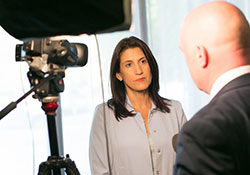Better prepared for health emergencies in Central Europe

WHO/Igor Vrabie
50 health sector officials from 10 central European countries convened for a workshop on risk communications in Chișinău, Republic of Moldova, during the first week of July 2015.
"This has been a great experience for us as communicators. We have learned the theoretical part, but also in practical terms how to handle the media and health risk situations in the field", said Valentin Popescu, Personal Councillor to Dr Arafat, Department for Emergency Situations, Romania.
The goal of the interactive workshop was to strengthen national and inter-country capacity for emergency risk communication in the framework of the International Health Regulations and pandemic influenza preparedness. It included keynote speeches, lectures by experts, media drills and a simulation exercise. Participants also shared experiences with peers from neighbouring countries. National risk communication plans will be revised as a follow-up to the training. The workshop was organized by WHO/Europe and hosted by the Ministry of Health of the Republic of Moldova.
"The trainers tried to engage each participant in the discussion, and even though I don't work in communications, I have gained knowledge that I will use, such as planning in advance what I want to tell people, and having a clear idea of what I want them to hear and do as a result," said Ganna Radysh, National Professional Officer at the WHO Country Office in Ukraine.
Jarno Habicht, WHO Representative in the Republic of Moldova added, "It is great that we can facilitate the friendship between different experts, not just in one country but in neighbouring countries, because diseases don't respect borders. The take-home messages from this workshop are to 'be well prepared' and 'get to know your colleagues and media experts and build networks in advance'."
Those taking part included national health sector professionals on risk assessment and response to acute public health events, and communications specialists from the Czech Republic, Estonia, Israel, Latvia, Lithuania, the Republic of Moldova, Poland, Romania, Slovakia and Ukraine.
A similar workshop was organized in 2014 in Serbia for Balkan countries, and the next is due to take place in Central Asia in 2016.



